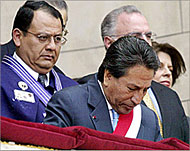Peru declares emergency
President Alejandro Toledo on Tuesday declared a state of emergency across Peru and prepared to send out armed forces to curb a wave of violent strikes.
 |
| Toledo: Desperate move |
Toledo, announcing this over television, said the emergency would last for 30 days. The emergency will enable people to exercise their personal liberties and travel freely, he said.
Toledo’s presidency has been marred by social unrest. This week, thousands of farmers and health workers joined teachers who have taken to the streets. They marched through the capital and occupied state buildings in provincial cities.
The protestors blocked highways with boulders and burning tyres leaving commuters stranded. Trucks loaded with food were held up as well.
Among other things, the agitators have been demanding salary hikes and tax cuts. Teachers have asked for a raise of $60 to the average monthly wage of $200.
No money
But the government has said it does not have money to meet the demands without endangering International Monetary Fund-endorsed pledges of fiscal discipline. It has offered teachers a hike of $29.
This is the second time Toledo has declared a state of emergency. He made the same decree in June 2002, but that was limited to the southern city of Arequipa.
More is in store. Peru’s trade unions have threatened a massive general strike in July against the government’s market-friendly economic policy.
Toledo was elected to power in 2001 on promises he would restore transparency and true democracy in Peru following the corrupt, authoritarian regime of the previous President Alberto Fujimori.